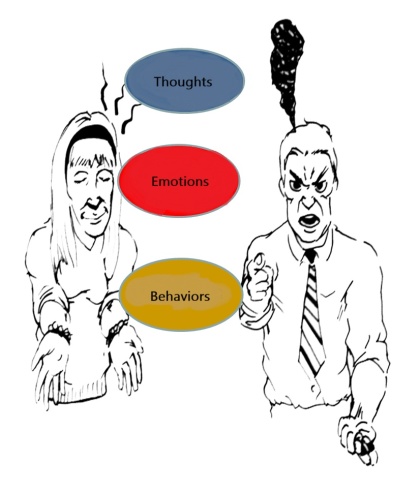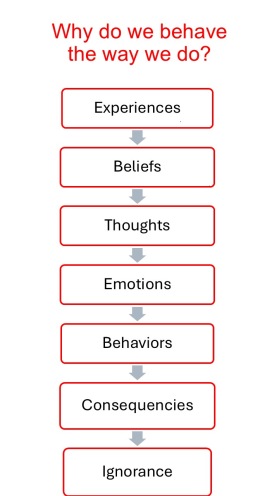Explanations
to why we behave the way we do
- Experiences. Childhood experiences have given us beliefs that we are not aware of.
- Beliefs are unconscious and control our thoughts, emotions and behaviors
- Thoughts are related to our beliefs.
- Emotions are triggered by the thoughts we have.
- Behaviors are controlled by the thoughts and emotions we have.
- Consequences. The consequences are positive in the short term or not negative enough to encourage another behavior
- Ignorance. We can choose our thoughts, emotions and behaviors, but we don't know how to do it.
What can make us change behaviors?
- We see what consequences our behavior has in the short term and in the long term.
- We gain knowledge and begin to observe our own thoughts, feelings and behaviors. We become an observer of ourselves.
- We find out what experiences we had before the age of 7. Did something traumatic happen or something difficult that went on daily?
- We reveal our beliefs that we took on as a result of these experiences. In this way we can also change them.
- We make emotional contact with our inner child who then gets an opportunity to express its feelings. A need it has based on the fact that it has not been seen, heard or understood.
- We choose to do what makes us feel good! We fill "our cup" with what feels good, environment, activities and people who fill it up.
We can choose thoughts, emotions and behaviors

The same behavior are perceived different depending on how we ourselves feel. When we feel good, we can tolerate negative behavior, we can "translate" it into something neutral. If the other person's behavior feels offensive, we can feel good about speaking up in an honest and clear way. When we ourselves behave offensively, we can react by feeling guilty and ashamed. Understanding why we behave the way we do is of great importance.
Is this something familiar to you or does it feel new that thoughts and feelings determine what we do and how we do it.
What expectations can do to us is exciting. The example of the teacher who took over a class and was told that Kalle and Stina were the best in the class and the expectations came true, they came to perform best. When the school year was over, the teacher was told that Kalle and Stina were the ones who had performed the worst in previous school years. The teacher had, with his expectations = his thoughts, feelings and behaviors (which were experienced by the students through the teacher's energy, voice and body language) created the environment the students needed.
This is also true when it comes to ourselves. What expectations do you have of yourself?




